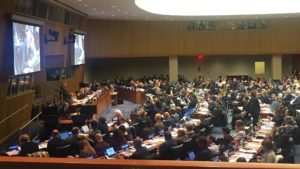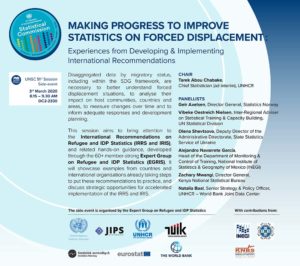The UN Statistical Commission’s 51st session was a major and long-awaited milestone for the Expert Group on Refugee and IDP Statistics (EGRIS). Since the Commission’s 49th session in 2018 – where the International Recommendations on Refugee Statistics (IRRS) and the Technical Report on IDP Statistics had been endorsed – we had been working hard to jointly develop the recommendations on IDP statistics and the manual to support the implementation and mainstreaming of the recommendations on statistics on forcibly displaced persons into national statistical systems (read more about this process). It was truly rewarding to receive such an overwhelming support from the Commission and its member states for the International Recommendations on IDP Statistics (IRIS) and the accompanying Compilers’ Manual, together with their approval of the terms of reference for a third mandate to the Expert Group.

17 Member States from different regions and several UN agencies spoke up during the plenary session at the UNSC 51st session, to express their support to the recommendations and guidance put forward by the Expert Group.
Around 17 Member States from three different regions – Africa, Europe and Asia – as well as several UN agencies took the floor to speak up and voice their support for the recommendations and their implementation at country level. They strongly emphasised the need for capacity building and some also encouraged that the manual be enhanced specifically to better account for the gender dimension in forced displacement situations. The Commission in its final decision, furthermore stressed the need for translating both the IRRS and IRIS in all UN languages, and invited international and national actors to support member states in the implementation of these recommendations.
“We embarked on this journey back in 2016, together with over 40 countries, as well as international actors and subject matter experts. It has been incredibly enriching and rewarding to work with the diverse membership – national statistical offices, international agencies, displacement experts, academics, and other actors. The EGRIS has contributed significantly (and continues to do so) to the growing impetus around improved statistics on forcibly displaced populations, also reflected in the recent push for an SDG indicator on refugees.” – Natalia Krynsky Baal, former JIPS Coordinator (read the related article).
Country implementation was also at the center of a side-event organized by EGRIS’ Steering Committee members, where Mexico, Ukraine and Kenya shared their efforts already underway to implement the international recommendations on refugee and IDP statistics. In Mexico and Ukraine, these include ongoing efforts implemented with support from JIPS, on capacity building for improved displacement data and informing durable solutions for IDPs respectively.

The event “Making Progress to Improve Statistics on Forced Displacement” took place on the sides of the UNSC’s 51 st session, featuring Mexico, Ukraine and Kenya.
Another event co-hosted by Norway and Denmark and moderated by the UNHCR-World Bank Joint Data Centre on Forced Displacement (JDC), furthermore discussed the need for, and the use of better data and official statistics for policy design and decision making at the political level. In the case of Colombia, efforts to mainstream IRIS recommendations into the national statistical system have also brought critical institutions, including the National Statistical Office and the Victims’ Unit, to collaborate much more closely together. The inclusion of the new indicator on refugees into the Sustainable Development Goals (SDG) indicator framework, also endorsed by UNSC during its 51st session, further underlines the importance of such stepped-up action and leadership by national governments on forced displacement statistics and reporting.
During the third phase, the Expert Group’s focus will mainly be on raising awareness about and supporting the implementation of the international recommendations on refugee and IDP statistics. This will include capacity building, technical support to vulnerable countries and facilitated peer-to-peer exchange. We also hope that the recently initiated Secretary General’s High-Level Panel on Internal Displacement, through its work over the coming months and the resulting final outputs, will further leverage our efforts towards improved official statistics on forced displacement.
As we are embarking on this exciting new phase, and given the novelty of including official statistics on forced displacement into the regular production of national statistics as well as the nature and specific characteristics of such statistics, there is a great opportunity to incorporate innovative ways to collect data and make use of technological advancements. This was also pointed out during the discussions on the side of the UNSC session in March, and has since then gained in relevance as we are now facing the challenges of the global pandemic of COVID-19, with a direct impact on data collection.
At JIPS we will continue our strong engagement in the EGRIS, both at Steering Committee level and by leading the work on IDP statistics. We are currently also working to integrate recommendations from the IRIS into our technical and capacity building support at field level, as well as our efforts at global level, including through a joint conference on the topic of “Building Capacity to Improve Statistics on Forced Displacement” in September 2020 (more details following soon).